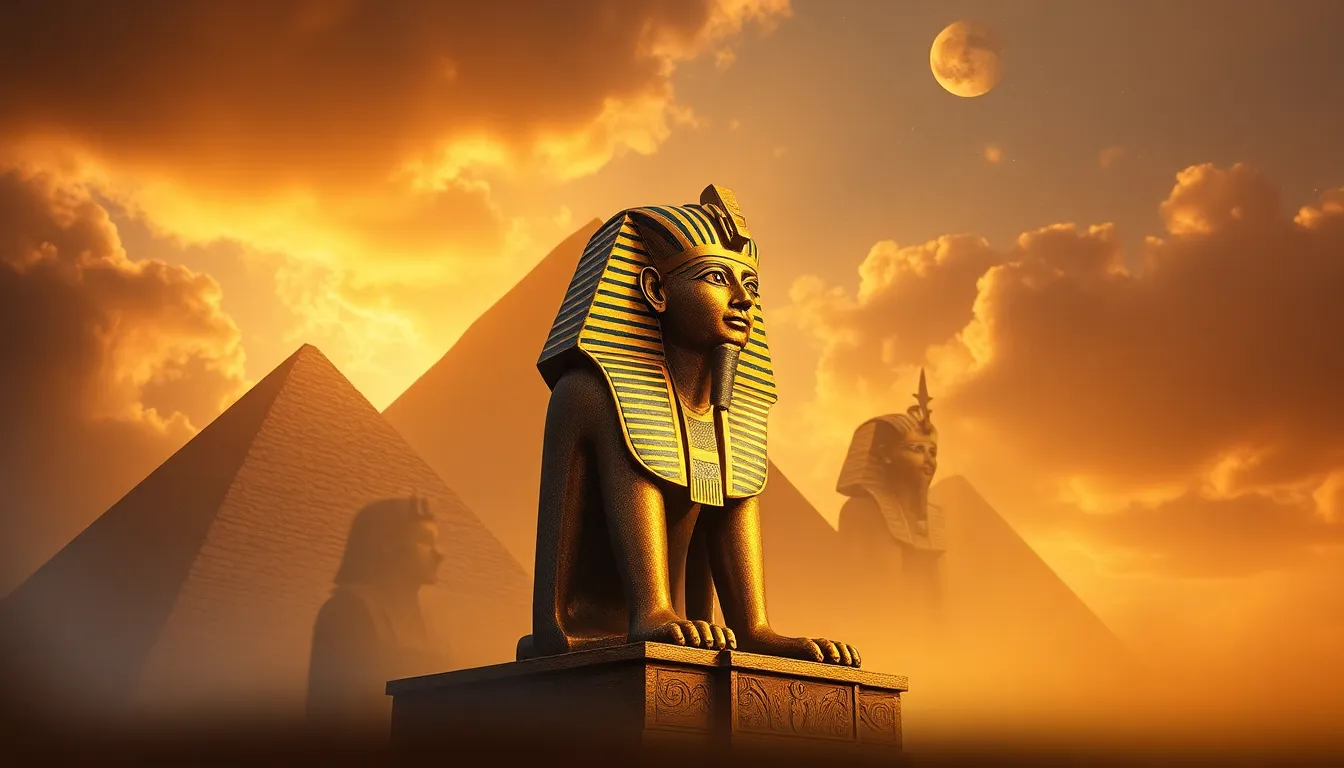The Divine Myths of Pharaohs and Their Connection to the Gods
I. Introduction
The ancient civilization of Egypt is renowned for its rich tapestry of mythology and its fascinating rulers, the Pharaohs. These leaders were not merely political figures; they held an esteemed position as divine intermediaries between the gods and the people. In understanding the complex relationship between Pharaohs and the divine, we can gain insight into their authority and the cultural significance of their reigns.
This article aims to explore the intricate connection between the Pharaohs and the gods, delving into the myths that elevated their status and ensured their power over the land.
II. The Role of Pharaohs in Ancient Egyptian Society
Pharaohs in ancient Egypt were central figures in both governance and religion. Their authority encompassed a dual role, as political leaders and spiritual guides.
- Political and religious authority of Pharaohs: Pharaohs were considered the highest political leaders and held ultimate authority over the land, laws, and military. They were also viewed as divine figures, embodying the will of the gods.
- Pharaohs as intermediaries between gods and people: The Pharaohs acted as mediators in rituals and ceremonies that connected the common people to the divine. This role reinforced their importance and presence in daily life.
- The concept of Ma’at: Ma’at, the ancient Egyptian concept of truth, balance, and order, was essential to the Pharaoh’s rule. Maintaining Ma’at was seen as a divine duty, and the Pharaoh was responsible for its preservation.
III. The Pantheon of Egyptian Gods
The ancient Egyptians worshipped a vast array of gods and goddesses, each representing various aspects of life and the universe. The Pharaoh’s connection to these deities was crucial in legitimizing their reign.
- Overview of major gods and goddesses: Key figures included Ra (the sun god), Osiris (god of the afterlife), Isis (goddess of magic and motherhood), and Horus (the sky god).
- Specific gods associated with Pharaohs: Horus was often depicted as the protector of the Pharaoh, while Osiris symbolized resurrection and eternal life, reinforcing the notion that Pharaohs were divine.
- Symbolism of gods in reinforcing divine rule: The association with gods served to enhance the Pharaoh’s legitimacy, as they were seen as the earthly representation of divine will.
IV. Creation Myths and Their Influence on Pharaohs
Creation myths played a significant role in shaping the narrative surrounding the Pharaohs’ authority. One of the most notable myths is that of Atum, the creator god.
- The creation myth of Atum: According to the myth, Atum created himself and subsequently gave birth to other gods. This narrative established a divine lineage that linked Pharaohs to the very origins of the universe.
- The role of divine birth: Many Pharaohs claimed divine parentage, asserting that they were born of the gods. This idea legitimized their rule and connected them to the celestial order.
- Relationship between creation stories and divine kingship: The creation myths emphasized the Pharaoh’s role as a divine ruler, reinforcing the belief that their authority was ordained by the gods.
V. Divine Kingship: The Pharaoh as a Living God
The concept of divine kingship established the Pharaoh as a living god on Earth, a notion deeply embedded in Egyptian culture.
- Pharaohs embodying gods: Pharaohs were often identified with gods such as Horus during their reign, and Osiris after their death, emphasizing their divine nature.
- Rituals and ceremonies: A series of elaborate rituals, including coronation and funerary rites, were performed to reinforce the Pharaoh’s divine status and connection to the gods.
- Significance of death and afterlife beliefs: The belief in an afterlife where the Pharaoh would ascend to the heavens as a god highlighted the importance of their divine role, further solidifying their legacy.
VI. Mythological Narratives and Their Impact on Governance
Myths were instrumental in shaping the policies and governance of the Pharaohs, serving as a tool for state propaganda.
- How myths shaped policies: Myths provided a framework for justifying actions taken by the Pharaohs, linking their decisions to divine favor or decree.
- Use of myths in state propaganda: Pharaohs utilized myths to craft their public image, portraying themselves as divinely chosen leaders with the right to rule.
- Examples of Pharaohs utilizing myths: Pharaohs like Ramses II and Akhenaten used divine narratives to legitimize their reigns and supplant the traditional order with their theological innovations.
VII. The Legacy of Pharaohs’ Divine Myths
The divine myths surrounding Pharaohs have left a profound legacy on Egyptian culture and beyond.
- Lasting impact on Egyptian culture: These myths influenced art, literature, and religious practices, embedding the idea of divine kingship in the cultural psyche.
- Influence on later civilizations: The concepts of divine rule and the afterlife influenced subsequent cultures and religions, including aspects of Christianity and Islam.
- Modern interpretations: Today, the legacy of Pharaohs is often portrayed in films, literature, and art, reflecting the enduring fascination with their divine myths.
VIII. Conclusion
In summary, the connection between Pharaohs and the gods is a fundamental aspect of ancient Egyptian culture that underscores the nature of their authority and governance. Understanding these divine myths offers valuable insights into the historical context of leadership and power dynamics in ancient Egypt.
As we reflect on the significance of these myths, it becomes clear that their influence continues to resonate through history, shaping perceptions of leadership and the divine across cultures and eras.




